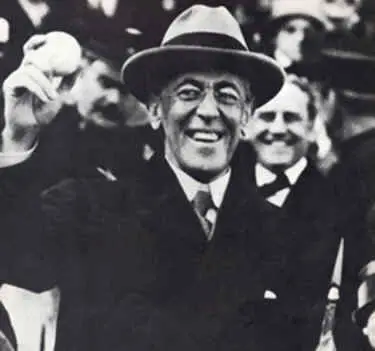Woodrow Wilson was president of America when the Versailles Treaty was signed. Unlike Georges Clemenceau he believed that a more moderate approach was needed to Germany after her defeat in World War One. In this sense, he was similar to Lloyd George of Britain who privately wanted Germany to remain relatively strong so that the country could act as a bulwark against the communism that he believed would spread from Russia.
|
|
Woodrow Wilson was born in 1856. He became America’s 28th president. His father was a strict Christian minister and Woodrow Wilson was brought up in a household associated with such beliefs. He was educated at Princeton and then at the University of Virginia and John Hopkins University. In 1890, he was appointed a professor at Princeton, a position he held until 1902. From 1902 to 1910, Woodrow Wilson was president of Princeton.
In 1910, Woodrow Wilson was elected governor of New Jersey for the Democrats. He swiftly got national fame for his social reforms in New Jersey and in 1912 won the presidential election.
As president, Woodrow Wilson concentrated on issues that mattered to him – such as anti-trust legislation to ensure that the people of America got a system that was fair to them. Woodrow Wilson also embarked on reorganising the federal banking system.
From 1914 to 1917, he observed a strict neutrality in the Great War but the activities of German U-boats forced his hand especially with the sinking of the ‘Lusitania’ in 1915 which killed 128 American citizens. On April 6th 1917, America entered the war as an “associated power” rather than as an ally of France and Britain. Ironically, Woodrow Wilson had won the 1916 national election on the slogan “He kept us out of war”.
During the peace talks at Versailles, Woodrow Wilson presented a moderate voice. He had no doubts that Germany should be punished, but he wanted those in power punished – not the people. On January 1918, Woodrow Wilson had issued his ‘Fourteen Points’ as a basis for peace. He also had an idea for a League of Nations to maintain world peace. In international affairs, Woodrow Wilson proved somewhat naïve. He wanted to place the trust for future world peace in the hands of the League of Nations, yet America refused to join it. By refusing to join the League, the American political structure had seriously weakened the forerunner of the United Nations. Woodrow Wilson spent time after 1919 criss-crossing America trying to ‘sell’ the idea of the League. On September 26th 1919, he collapsed and his political career ended suddenly. He was an invalid for the rest of his life and died in 1924.
Woodrow Wilson was an idealist whose plan for a League was permanently weakened by America’s refusal to join it. His Fourteen Points were fine on paper but no nation was willing to substantially support them. As a Democrat, he had to deal with a Senate that had a Republican majority in it after the end of the war – and party loyalty meant that his ideas for a world that would be peaceful would be killed off at a political level.
Related Posts
- The League of Nations came into being after the end of World War One. The League of Nation's task was simple - to ensure that…
